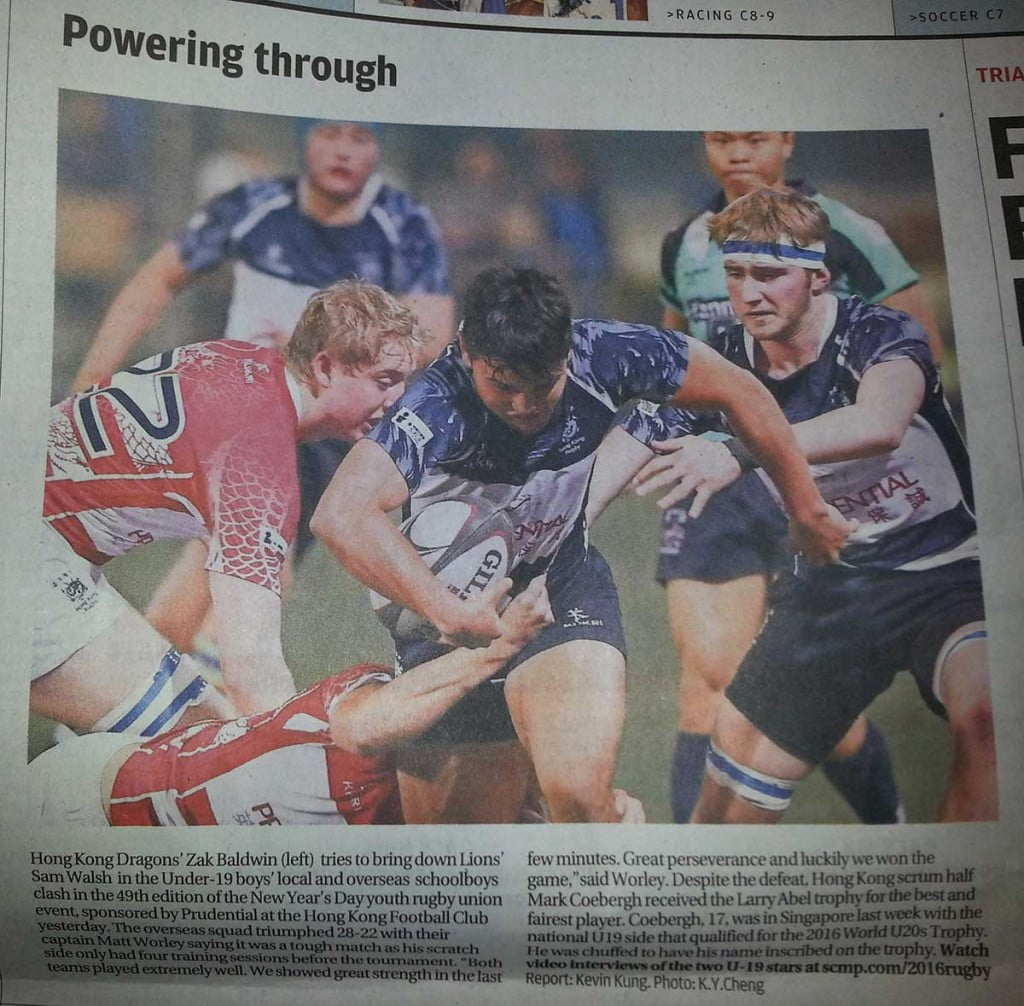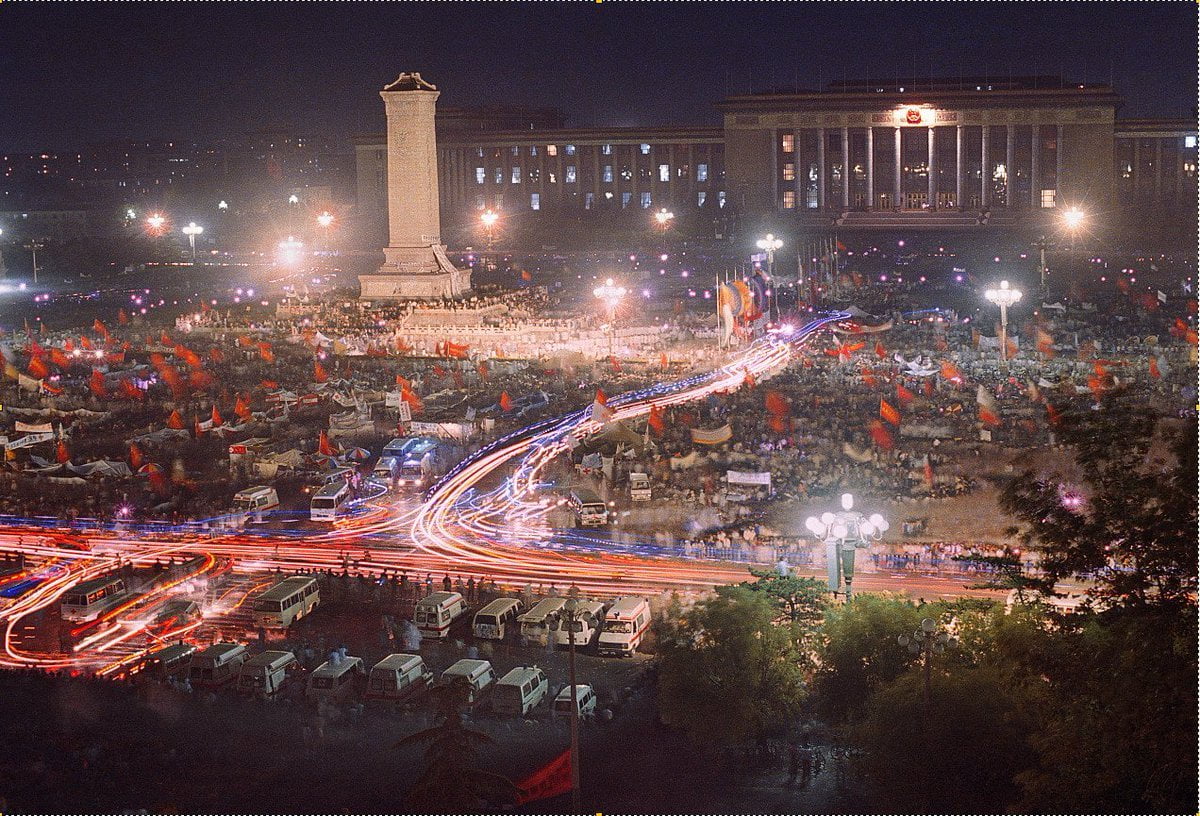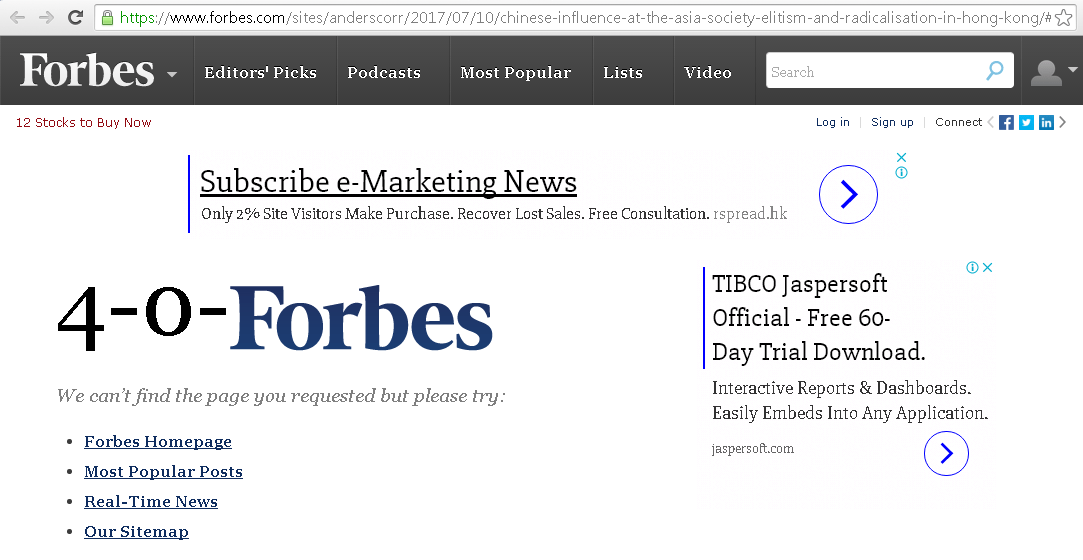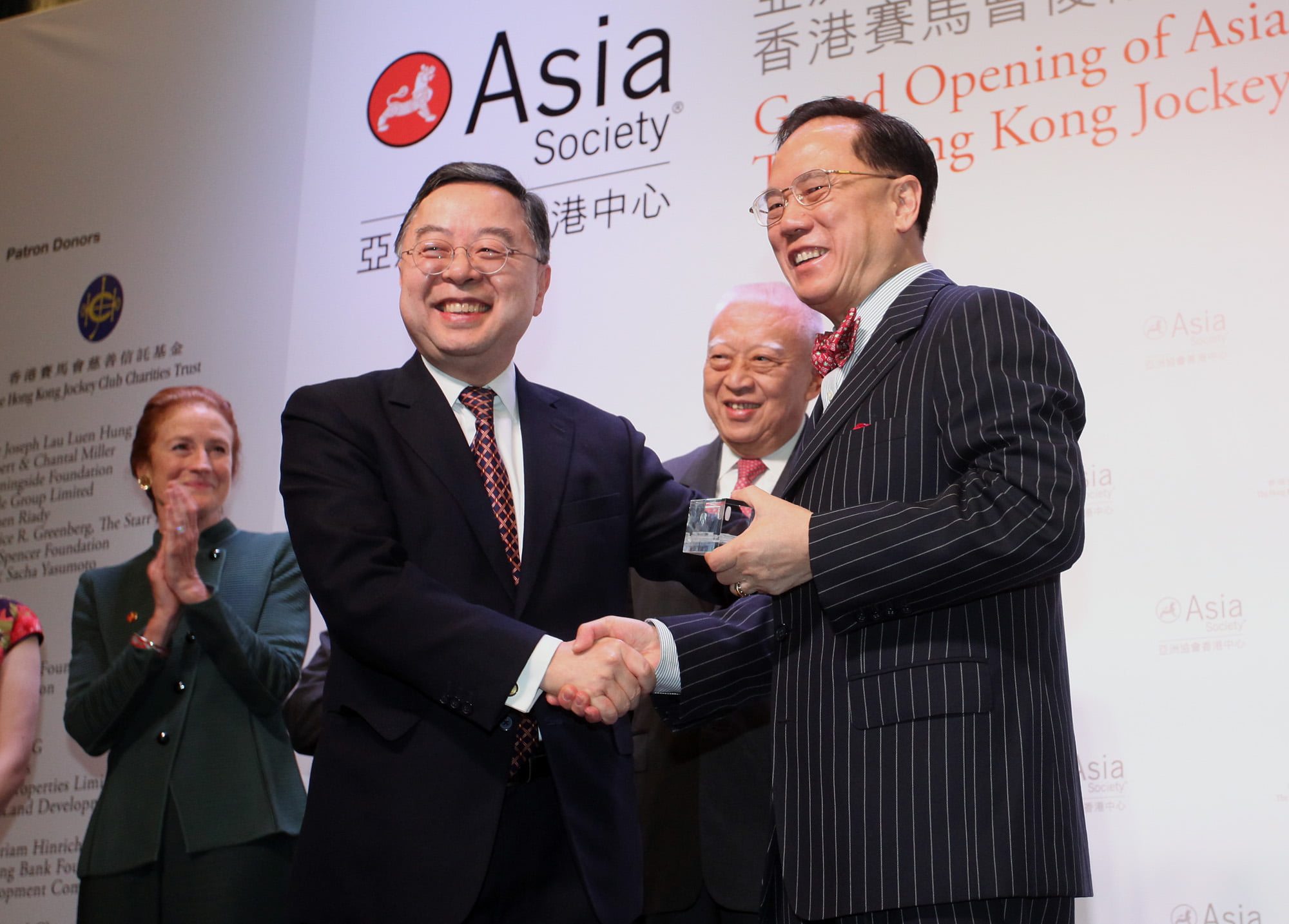A spectacular night view of the peaceful protest and mass hunger strike in Tiananmen Square in 1989. Before the CCP sent in the army to slaughter and murder thousands of unarmed peaceful protesters.
Tag: censorship
Forbes Deletes Article on Asia Society Billionaire Chairman Ronnie Chan
After the Asia Society blocked Joshua Wong speaking at the launch of a book about Hong Kong recently Forbes published an article written by analyst Anders Corr about the Asia Society’s local chairman Ronnie Chan.
The feature has since ‘disappeared’ from the Forbes website with Chan’s influence suspected to be behind Forbes decision to remove article. For those who missed it here’s Corr’s article in full.
The Asia Society recently barred a student democracy activist, Joshua Wong, from speaking at a Hong Kong literary event. It caused a wave of critical online comments and reporting on the Asia Society, and its influential billionaire donor Ronnie Chan. Chan is Co-Chair of the Asia Society in New York, and Chair of its Hong Kong Center, which has been likened to Chan’s private club.
Chan is known for his anti-democratic views, involvement in foreign policy think tanks, and extensive investments in mainland China. Those investments, as well as his investments in Hong Kong, give him an incentive to ingratiate himself with mainland authorities by promoting China’s foreign policies. Those authorities, after all, have the power to make or break Chan’s business. The issue is broader than Asia Society, though, as Chan and his family are major donors at influential institutions in the US, including Harvard University and the University of Southern California (USC).
Orville Schell of the Asia Society, and Susan Shirk, on the Board of Scholars at the Chan-affiliated USC US-China Institute among other roles, co-chaired an influential study of US-China Relations in February. Had Hillary Clinton won the US presidency, some in the Schell-Shirk task force, such as Shirk herself and Kurt Campbell of the Asia Group, would have been poised to seek influential positions in US government. The focus of Chan’s attentions on institutions that are politically influential on US-China relations raises the question as to whether China is seeking to use Chan, a dual US-Hong Kong citizen, to influence US foreign policy on China.
While the Hong Kong office of the Asia Society released a statement that said the decision to bar the democracy activist was “an error in judgment at the staff level”, several individuals with whom I communicated suspected Ronnie Chan’s influence to be behind the decision. That influence may or may not have been explicit. When a major funder shows a general preference against a class of people, for example democracy and freedom of speech advocates, then staff who counter that preference do so at the peril of their own organisation and jobs.
“Sounds like someone will take a bullet for Ronnie (that is, after all, what he pays them for),” said Joe Studwell, author of How Asia Works and The China Dream. “Ronnie will retain all powers and be left to figure out new ways to avoid any ‘controversy’ at Asia Society HK [Hong Kong]. I’d go for a pure, unspoken focus on ‘cultural’ issues, just like Beijing would want. No contemporary sociology, politics, economics, etc. More oracle bones and Ming vases.”
That prediction would be consistent with recent trends at Asia Society Hong Kong against politically controversial figures stretching back to at least 2009. At least four persons who support democracy and freedom of speech, in addition to Joshua Wong, may have been barred from the Hong Kong chapter of the Asia Society, including Martin Lee, Evans Chan, James Mann, and Renee Chiang.
Martin Lee is the founding Chair of the Democratic Party in Hong Kong. He was arrested during the 2014 democracy protest. According to one source, he has never been invited by the Asia Society in Hong Kong to an event.
Evans Chan filmed a documentary on the 2014 democracy movement in Hong Kong. He said that, “last October, Asia Society cancelled a screening of my film, Raise the Umbrellas, for an ‘unbalanced’ post-screening discussion with Martin [Lee] & Benny Tai.” The New York Times covered the cancellation without apology from the Asia Society, which indicates that the action was probably noted by its leadership without change in policy, since Asia Society Hong Kong repeated itself with Joshua Wong and in at least one other case.
James Mann of the Los Angeles Times commented on Facebook on July 6, “I was asked to speak in Hong Kong a few years ago, and Ronnie Chan vetoed my appearance. The only surprise to me here is that the Asia Society in NY, which professes a belief in liberal values, should allow this sort of thing to happen again and again and again. I guess they must need his money desperately.”
Renee Chiang, the wife of publisher Bao Pu, commented on Facebook that, “I can also confirm being turned down by Asia Society Hong Kong when the Zhao Ziyang book (Prisoner of the State) was published in 2009. Meanwhile, Asia Society in New York hosted a panel talk about the book, at which Orville Schell admitted getting a phone call from Chinese authorities voicing their disapproval, yet they did what they should do: they ignored the threat and held the talk anyway. In Hong Kong, no such call is needed, as they appear to have in-house censors.”
Studwell noted that “the HK government gave Ronnie a very valuable piece of public property (the old arsenal), which he was then allowed to refurbish… and operate as a sort [of] quasi private members club. But the whole thing, surely, only worked because the Asia Society in the United States of America let him use its brand to get his hands on the place.”
The question is then whether the Asia Society headquarters in New York, including its Co-Chair and 66 trustees, are complicit in what appears by its repeated programming decisions in Hong Kong, to be amplification of Chinese government propaganda. What do the Asia Society Co-Chair and trustees, some of whom do business in China, get out of the deal? Is the Chinese government seeking to use Chan to politically influence these trustees and others? Are the trustees seeking access or favors from Chan in China? Chan and staff of the Asia Society Hong Kong office did not reply to requests for comment.
Chan has connections, sometimes very weighty ones, at Harvard University in Cambridge Massachusetts, the University of Southern California in Los Angeles, the Peterson Institute for International Economics in Washington D.C., the World Economic Forum in Switzerland, the East-West Centre in Hawaii, and the Council on Foreign Relations in New York and Washington D.C. These connections are facilitated by donations or the hope of donations, according to a source. The Chan family, through its Morningside Foundation, donated $350 million to Harvard University. This is the largest ever single donation to Harvard.
The latest Asia Society controversy has “renewed questions about the influence that China, and people with deep business interests in China, hold over universities, nongovernmental organisations and other groups that rely on wealthy donors,” wrote Austin Ramzy at The New York Times. Ramzy noted that Ronnie Chan was an “outspoken supporter of Leung Chun-Ying, the pro-Beijing former chief executive [of Hong Kong] who was a target of the 2014 protests.”
Studwell said, “Doesn’t the Asia Society just show the problems of having corporate-led NGOs anywhere in the world? As an organisation it has totally failed to set up a governance system that could deliver freedom of speech. I don’t blame a Ronnie Chan-run Asia Society (HK) for that as his behaviour is entirely predictable based a) on his track record of kowtowing to all Establishments and b) on his vested interests in having a large mainland property portfolio. I personally think that the corporate US interests behind the Asia Society have more to answer for, though not much more because, as I said, corporate-led NGOs don’t work when push comes to political shove.”
Chan’s influence and connections, fueled by profits dependent on the Chinese government, could be used to promote China’s foreign policy interests among elites in the US And the elitism that Chan promotes is consistent with what elites in China think. Victor Shih said, “many in the elite stratum of China, even the younger generation, believe that most people in China, except for the elite, are incapable of making sound political decisions.” With President Trump’s election, that anti-democratic message could resonate among elite Democrats and Republicans alike, whose establishment political connections, for example through the Clinton and Bush families, were ruptured by Donald Trump’s election.
“Ronnie Chan is one of a small number of Hong Kong tycoons who are US-educated or had extensive US experience,” said Edith Terry, former opinion editor at the South China Morning Post in Hong Kong. “The most prominent members besides Ronnie are Tung Chee-hwa and Victor Fung. They regularly hold senior public roles in Hong Kong and most are also members of the Hong Kong delegation.” The CPPCC is a mainland Chinese government body.
Terry said, “The question of influence, however, is a subtle one. They represent a highly privileged class in Hong Kong that has huge vested interest in stability, a continuation of the status quo, not changing it. I believe that for this group, the game is more about keeping senior US policy makers and institutions engaged with the Hong Kong question. There is of course some exertion of soft power both ways. In this case, I would say the tycoons and the multinational elite here talk off the same page. Free speech only goes so far when talk of independence invites intervention by Beijing.
You could say they are all practical billionaires. Whatever their personal feelings are about free speech and Ronnie is notorious for speaking whatever is on his mind, and can be blunt to the point of rudeness in public before large audiences. They know that talk of independence is toxic and are convinced that the only way to stop it is to criminalise it by introducing a national security law, which would be in accordance with the Basic Law and is long overdue in their view. Ronnie and his cohort are extremely sophisticated and understand the usefulness of soft power through back channels and elite institutions. They are very good at it, and it is about being in position to deflect or argue points, not broadcasting simple, black and white messages.”
The perception of undemocratic influence that elites in Hong Kong have on international and domestic politics may be one cause for increasing political instability in Hong Kong. Michael Davis, former professor of law at the University of Hong Kong, said, “in the Hong Kong context this is more than just a free speech issue. I have long felt that the radicalisation of Hong Kong politics is due in no small part to the perception that the Hong Kong government and the pro-establishment business elites do not make much effort to represent the core concerns of Hong Kong people to the Central government and more generally. It seems to be a culture where they regularly lecture Hong Kong on Beijing’s requirements.
So if a prominent organization such as the Asia Society is thought to be leading the charge as Beijing’s mouthpiece in Hong Kong then that is a serious problem and contributes to the sense of futility among our young –not the sort of community service you would expect from such an organisation. Does the society have any mechanism at all to review its policies and practices?”
Studwell thinks that the Asia Society in New York should ask Chan to decrease his influence over programming in Hong Kong. Studwell writes, “I lay responsibility for all of this at the door of the Asia Society in the United States. If the Asia Society believes in free expression and debate, it should very politely, and gratefully given all the money, offer Ronnie two choices: 1. Ronnie steps down, and allows the Asia Society to put in place a governance structure that means that the Asia Society HK operates according to a clearly stated set of principles. Given the government ownership of the premises, I don’t think the HK operation can or should be run from the US. What is needed is a local system that operates according to transparent rules, preferably with an elected board. 2. The Asia Society removes its imprimatur and its moniker, Ronnie picks a new name (Asian Values Society(TM)?), and does things his way.”
Given Chan’s Co-Chairmanship of the Asia Society in New York, such a decision would likely have to be made by his Co-Chair, Henrietta Fore, along with at least half of the 66 trustees. Fore is former Administrator of US AID, and a member of the boards of Essilor International SA, general Mills, Exxon Mobil Corporation, and Theravance Biopharma Inc. The trustees include such personages as Ambassador John Negroponte, currently a Senior Fellow at Yale University, talk show host Charlie Rose, former Australian prime minister Kevin Rudd, and Stephen Schwarzman, CEO of Blackstone Group. Blackstone does extensive business in China, and has $368 billion in Assets Under Management. Chan may not be the only one seeking favor in Beijing.
These and other trustees should take action per Studwell’s advice, or risk their own reputations. The Asia Society, democracy, and free speech will be the better for it, though the trustees’ commercial access in China could suffer. That, like Asia Society’s decision to bar Joshua Wong, is a judgment call.
https://www.forbes.com/sites/anderscorr/2017/07/10/chinese-influence-at-the-asia-society-elitism-and-radicalisation-in-hong-kong/#69700cf53910
Asia Society Fail to Apolgise for Joshua Wong Censorship
 In a statement published on their website the Asia Society made no apology to either PEN or Joshua Wong about the censorship involved in their decision not to host the Hong Kong 20/20 book launch if Wong, a contributor to the book, spoke.
In a statement published on their website the Asia Society made no apology to either PEN or Joshua Wong about the censorship involved in their decision not to host the Hong Kong 20/20 book launch if Wong, a contributor to the book, spoke.
Statement on PEN Hong Kong Event, Joshua Wong
NEW YORK, July 6, 2017 — Asia Society takes this issue very seriously,
and after looking into the circumstances, it is clear that an error in judgement at the staff level was made involving the PEN Hong Kong event. Asia Society, throughout its history, has hosted events at all of its global locations with speakers representing all sides of major Asia-related issues. This has been one of our core principles since our founding in 1956; it’s still our policy today. We remain steadfast in our mission to serve as a global forum for meaningful and open dialogue.
In May, Joshua Wong spoke at Asia Society in New York along with other speakers from Hong Kong. Wong and speakers from all sides of the issue are welcome at Asia Society.
For more information, contact [email protected].
It’s sad to see an organisation that claims to “serve as a global forum for meaningful and open dialogue” refuse to apologise for looking to censor such open dialogue.
Tiananmen Square Vigil @ Victoria Park – 4 June, 2017
https://bcmagazine.smugmug.com/Bcene-photos/2017/4-June-tiananmen-square-vigil-Victoria-Park/i-QF48W8w
Tens of thousands of HongKongers gathered to remember those who died as China’s communist leaders turned their guns on their own unarmed people.
Tiananmen was 28 years ago, but the CCP continues to use violence to suppress freedom of speech, sexual equality and especially against those who speak out on corruption, incompetence, nepotism and party members self-enrichment.
While news of few of these violent put downs makes it past China’s draconian censors, we only need to see what has happened here in Hong Kong to know it’s far worse north of the border.
Here publishers disappear, kidnapped from our streets while the police do nothing. A police force that used to be respected and trusted by all. But now a force that cannot ‘see’ a pro-Beijing supporter beat someone up even when it happens infront of their eyes and is recorded on multiple cameras – yet thinks a woman’s breast is a weapon…
Sadly China is infesting Hong Kong with it’s corruption, bribery, censorship… anything that helps China’s leaders and their sycophants to make more money.
If China is so wonderful why do so many people there, especially the very rich CCP leaders, want to take their personal money out of the country and stash it in countries they claim to despise?
We cannot keep silent! We want to keep our city corruption free. Retain freedom of expression, the press, religion, sexuality, an impartial judiciary…as enshrined in the Basic Law.
If you prefer China’s vision of life, everyone working to enrich the chosen and connected few. Feel free to move North.
China gave us the Basic Law, article 25 of which states ‘HongKongers are all equal before the law’. Some though are more ‘equal’ than others and we’ve seen our government buy the tools and guns to suppress the views of those who disagree with China’s view of ‘equality’…
Who will hold a vigil for us?
https://bcmagazine.smugmug.com/Bcene-photos/2017/4-June-tiananmen-square-vigil-Victoria-Park/i-LB5dNsx
https://bcmagazine.smugmug.com/Bcene-photos/2017/4-June-tiananmen-square-vigil-Victoria-Park/i-g9CV32H/A
Google Looking to Censor Coverage of Charlie Hebdo Terror Attack
Today, over a year after the article was published google sent bc magazine a warning over bc’s coverage of the Charlie Hebdo terror attacks and our publishing of a series of iconic Charlie Hebdo covers.
In essence the warning was delete/censor the Charlie Hebdo covers article or we (google) will deactivate your adsense account and stop serving adverts to bcmagazine.net.
Here’s a link to the article www.bcmagazine.net/tag/satire/
bc magazine may not agree with every viewpoint expressed in Charlie Hebdo. But free speech and freedom of the press are two of the cornerstones of a modern society so we are 100% behind their right to use satire and humour to expose the absurd and ask questions of hypocrites – without getting shot.
Fuck off google!
[espro-slider id=10092]
Censorship, Intimidation and Harassment of SCMP Reader

It’s ironic that while on it’s front pages the SCMP vociferously advocates for press freedom and the release of Bo Lee and his fellow disappeared. The reality within it’s own pages is that of censorship, intimidation and harassment of any reader who dare criticise or question an SCMP employee. The exact type of actions that the SCMP would have its readers believe it looks to expose in others. The hypocrisy is sad.
On the 1 January the SCMP’s Kevin Kung spent 16 hours, working until 1am, on a story about the New Year’s Day Youth Rugby Tournament at HK Football Club. By his own admission he didn’t stay until the end of the tournament. A sterling effort you might think, except that the published article, a massive 250 or so words, quite simply ignores half the participants. Focusing solely on the boys rugby, reading his original story you’d never know that half the rugby played that day was by girls.
Linda Olson the administrator and driving force behind the Women’s Rugby Hong Kong Facebook group enquired politely of Mr Kung about the gender bias in his article.
“I am wondering why you only reported on boys’ rugby in the article below?
The headline makes it sound as if only boys took part.
The article itself makes no mention of the girls who played.
The video includes only brief coverage of girls rugby (the U12s team and captain).
This is unacceptable.
Nearly a quarter of rugby players in Hong Kong are girls/women and it is the most rapidly expanding demographic here.
Please ensure that your coverage is more inclusive in future..”
The article’s author Mr Kung replied and made some edits to ‘improve’ the online version of the article:
1. “Girls” was added to the sub-headline making it gender neutral.
2. A photo with caption of Gracie Hood (GH) was added.
3. An extra paragraph added to the end of the article mentioned the U19s girls’ game (but did not name the Captain as they had with the boys game) and GH being named Best and Fairest of the match.
Mrs Olson notified the WRHK Facebook group members of the changes and thanked Mr Kung for making them, at the same time providing a quantitative analysis of the gender imbalance of the SCMP coverage.
Mr Kung however had also cc’d in SCMP Sports Editor Noel Prentice who then fired off an intimidatory and threatening email to Mrs Olson which he cc’d to senior figures at the HK Rugby Union AND Mrs Olson’s employer!!!
Mr Prentice’s email is quite astounding in it’s arrogance, tone and less than full disclosure of facts.
“I take exception to you accusing my reporter and SCMP of sexist coverage when Kevin has gone out of his way to cover rugby and the New Year’s Day tournament. He spent 16 hours compiling the online and print coverage so please have some respect.
SCMP is a great supporter of rugby and we give what many consider a niche sport a disproportionate amount of coverage. (bc’s note: why, because the HK Rugby Union pay the SCMP a lot of money to write about local and international rugby). And we have also gone out of our way to cover the emergence of women/girls in the game and the opportunity they have been afforded.
We do not have the resources to give blanket coverage to any sport and all sports and events are judged on their news value.
We also strive to be fair and balanced and I would expect you to also adhere to these principles when delivering any gender bias lectures to the students of Li Po Chun United World College of Hong Kong.” SCMP’s Noel Prentice
If it takes Mr Kung 16 hours to write a 250 or so word article it does explain a lot about why the SCMP print edition is so thin and lacking in content compared to years past. Joking aside Noel Prentice’s email is factually mis-representative of Mrs Olson’s enquiry and comment; neglects to mention that the HKRU pays the SCMP lots of money to ‘support’ the writing and publishing of stories about rugby; and extremely patronising of the fairer sex “the emergence of women/girls in the game and the opportunity they have been afforded” and by assuming that boys rugby coverage is of value, while coverage of girls youth rugby has no news value.
If the original article was to quote Mr Prentice “Fair and balanced” then Mrs Olson wouldn’t have needed to contact Mr Kung and could have used the story to show how the media was covering girls and women’s rugby in the same detail as men’s rugby. That it didn’t make any mention of 50% of the tournaments participants makes it unbalanced not fully accurate and a perfect example of gender imbalance in the media – the subject of Mrs Olson’s frustration and her class.
Why Mr Prentice also cc’d Mrs Olson employer, in what appears to be a blatant intimidation attempt to damage her professional standing and work relationship with her employer – while at the same time looking to censor the use of SCMP content in an education setting – is something the SCMP failed to answer when bc emailed them asking for a comment.
Read the full email conversation here – email addresses have been removed to protect people’s privacy.
Read about women’s rugby in bc magazine and here on the Women’s Rugby Hong Kong facebook group.
The Battle for Hong Kong’s Cyberspace
https://bcmagazine.smugmug.com/Bcene-photos/2014/OccupyHK-29-September-2014/44640815_wssnHW#!i=3572981998&k=7BcXHJj
A recent paper by Lokman Tsui, a professor at the School of Journalism and Communication of the Chinese University of Hong Kong offers a chilling look at how authorities in Hong Kong outdid their rivals during the 79-day Occupy Central movement that hit the city in late 2014.
The Occupy movement braved police violence as well as political pressure and intimidation on and offline from Hong Kong and mainland Chinese authorities before being driven out by police. Technology played an important role in the movement’s organization and coordination, becoming “a critical channel for communication with the public,” according to Tsui. He described this as “a fairly typical script” for how technology aids social movements.
In response, the government not only defended itself but, as Tsui states, went on the offensive. His paper describes the various tactics deployed by the government and its allies to dissuade and diminish the Occupy movement.
Abusing outdated online surveillance laws
The current surveillance regulation ordinance only refers to telephone, fax and postal mail, and makes no mention of Internet communications. By repeatedly refusing to confirm whether its protections extend online, the government is implying that there are none.
Twisting an online fraud protection law to arrest activists
“One of the more problematic arrests made under [Crimes Ordinance] Section 161 includes charging a 23-year-old from Mongkok with ‘access to computer with criminal or dishonest intent’ and ‘unlawful assembly’ for allegedly messaging folks on an online discussion forum to join him in a protest in Mongkok.”
De facto online censorship using content removal requests
“The number of requests for content removal in the four months of October 2014 until February 2015 exceeds the number of requests made in the previous four years combined.”
DDoS attacks on an unprecedented scale
“The pro-government side was able to hit a series of critical websites with an unprecedented amount of junk traffic (500 Gigabytes per second), including the website of the Apple Daily, a pro-democracy newspaper in Hong Kong, and PopVote, Hong Kong University’s online voting platform, leading Matthew Prince, the CEO of a hosting company that specializes in DDoS protection, to call it the ‘largest cyber attack in history.’”
Paid “50 cent” Internet commenters
Pro-government comments flooded online forums, blogs and social media networks similar to the paid online commentators working for the government elsewhere. It is generally believed that the pro-government commentators are hired by political groups sponsored by the Hong Kong government and Beijing.
Painting technology-related activities as a US conspiracy
In the case of Hong Kong, the government was “pushing a narrative of ‘foreign interference’, a xenophobic narrative that accuses civil society organizations of being inauthentic, that they are being used and funded by foreign governments, especially the United States government, who seek to undermine and weaken China by fomenting revolution in the name of ‘democracy.’”
Tsui ends the paper on a sobering note:
The Internet still has the potential to empower social movements; they might even allow temporary gaps of freedom. But the [Occupy Hong Kong] movement suggests that both the Internet and Hong Kong are at a crossroads, that both cannot take its freedoms for granted. This is not to say that spaces of autonomy and freedom no longer exist online or in Hong Kong; however, they are increasingly being marginalized and, at this point in time, are best understood as the exceptions rather than the norm.
Tsui’s paper, titled The Coming Colonization of Hong Kong Cyberspace: Government Responses to the Use of New Technologies by the Umbrella Movement, was published in the Chinese Journal of Communication in July 2015. Read the full paper on Tsui’s blog.
Originally published on Global Voices, some edits made ![]()




